Today's Saturday • 7 mins read
— By Dr. Sandip Roy.
What makes life meaningful?
It’s a question humans have asked for thousands of years. How we answer it varies by person, country, and culture.
The Pew Research Center asked over 19,000 people across 17 countries a simple question: “What gives your life meaning?”
The answers revealed that while our cultures and circumstances change, many things that bring meaning to life remain deeply human and the same.
Let’s look at what people around the world said about what they value in life.
Top Sources of Meaning: What Makes Life Meaningful
Overall, 72% of people across countries said they believe life has a specific meaning or purpose.
Pew found the following as the most common sources of purpose and life satisfaction:
- Family and close relationships (69%)
- Health and well-being (52%)
- Career or work (43%)
- Hobbies or interests (42%)
- Religion or spirituality (40%)
- Helping others (37%)
- Financial stability (31%)
- Personal achievement (26%)
- Living by one’s principles (25%)
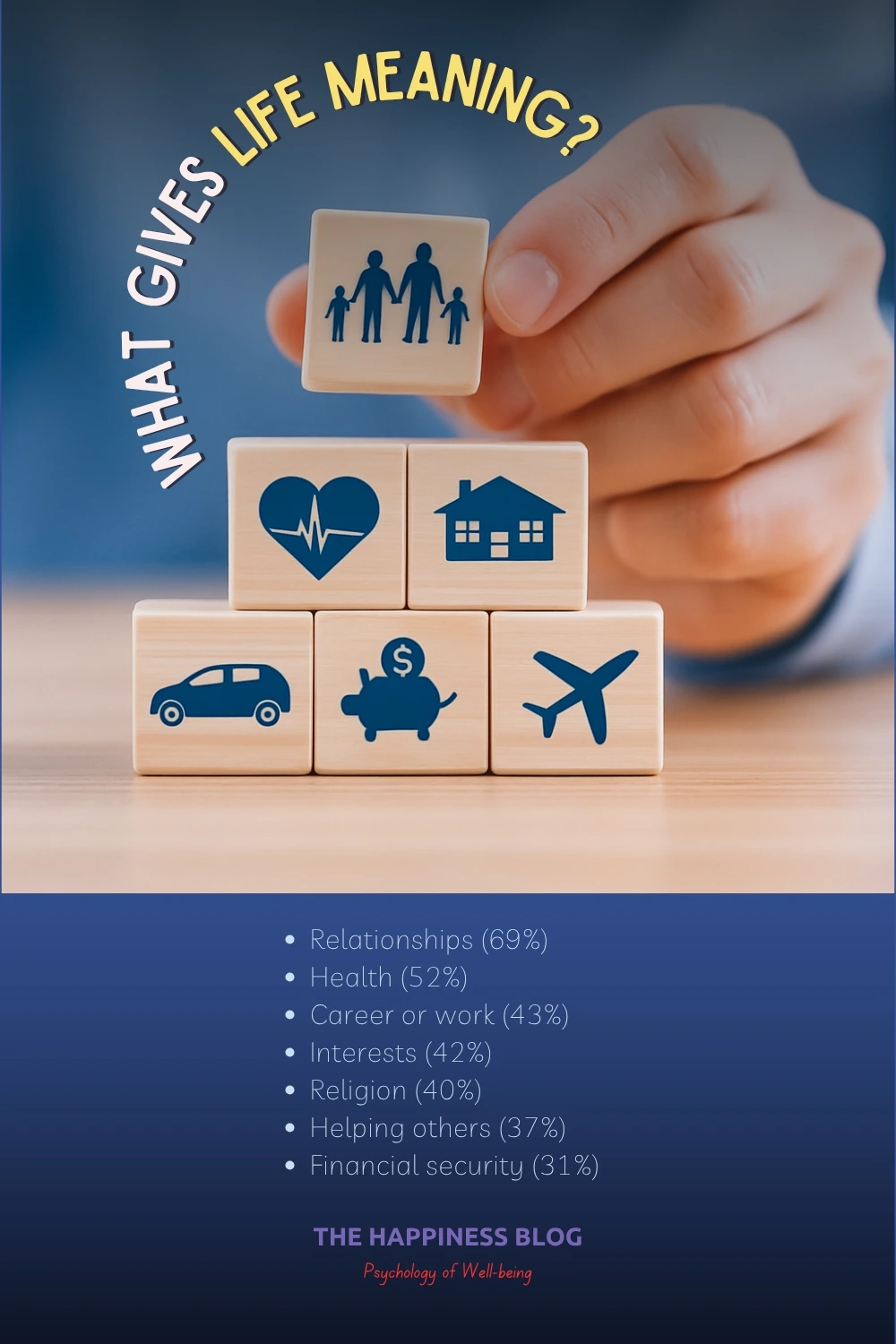
Each region had its variations, but one element clearly led the list: family and close relationships.
1. Family and Relationships
Family was the strongest source of meaning in almost every region except parts of Asia.
- In 14 of 17 countries, people ranked family as the most meaningful part of life.
- Friends also played a major role, especially for younger respondents.
But not all relationships add to our sense of purpose. If your interactions regularly leave you depleted instead of supported, it may be healthier to give yourself distance and surround yourself with people who genuinely care.
Meaningful life = meaningful relationships, not necessarily more relationships.
2. Health and Well-Being
Health was the second-most meaningful aspect of life for many people, especially in European nations like Sweden, Germany, and the Netherlands.
Good health enables independence, movement, and connection.
Illness often brings meaning into sharper focus, but most people said that simply being able to work, live without pain, or care for oneself gave life a strong purpose.
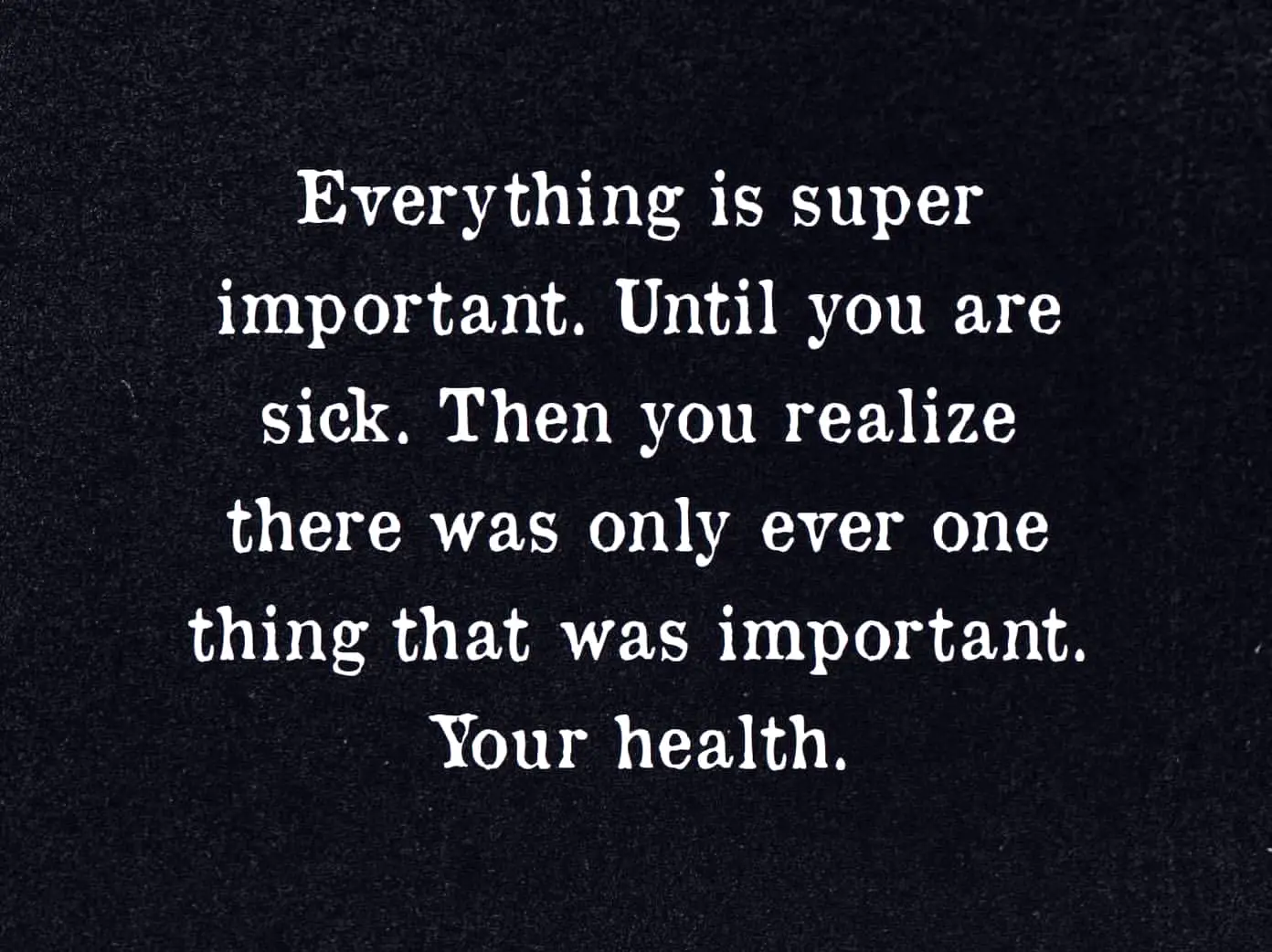
3. Work and Career
About 43% of people said their jobs give their lives meaning.
Not just because work pays the bills, but because it can provide:
- pride and purpose
- a sense of contribution
- a way to learn and grow
- connection through colleagues
Even so, many recognized that meaning at work depends on more than status or income. Work that aligns with one’s values or strengths tends to feel more purposeful.
4. Hobbies and Personal Interests
Many people also pointed to personal passions, like reading, music, cooking, sports, and gardening, as sources of deep meaning and pleasure.
Pew found younger people were more likely to mention hobbies, friendships, and education as key drivers, while older adults more often mentioned retirement, peace of mind, and health.
Even a single engaged hobby can anchor a meaningful life.
5. Faith and Spirituality
Religion or spiritual faith was meaningful for 4 in 10 people surveyed.
This was especially true in countries with strong religious traditions, including the United States, Greece, and Italy, but much less so in wealthy East Asian countries like Japan and South Korea.
Faith gives some people a cosmic purpose, offers moral guidance, and connects them to something larger than themselves.
6. Helping Others
Helping others is one of the most reliable ways to add meaning to life. Studies show people who give to charity are more satisfied with their lives.
In the Pew study, 37% of people said that contributing to others gave their lives a clear sense of purpose. It could be through charity, volunteering, caregiving, or social contribution.
Volunteering doesn’t just strengthen communities; it benefits the helper too. Research shows:
- People who volunteer regularly report lower stress levels and better mental health.
- Donating money, even in small amounts, activates the brain’s reward centers, increasing feelings of happiness.
- A large review found that givers are 43% more likely to describe themselves as “very happy” compared to non-givers.
- Altruism has been linked to lower rates of depression and longer life expectancy.
What you give doesn’t have to be money. Time, attention, encouragement, skills, or even presence can help someone feel seen and valued.
Altruism isn’t about self-sacrifice; it’s about shared humanity. It’s the sense that your actions ripple beyond yourself into something larger and more enduring. Studies show altruism can make our lives more meaningful.
Helping others gives life a narrative of significance.
Meaning Isn’t the Same Everywhere: Regional Differences
Not all cultures seek meaning in the same places. The study pointed out interesting differences:
- East Asians (Japan, South Korea, Singapore, Taiwan) were less likely to say family, faith, or community gives life meaning.
- Americans tended to emphasize religion and personal freedom more than Europeans.
- Younger respondents mentioned education and hobbies more than older people.
- Romantic partners ranked surprisingly low in most countries, especially in Asia.
- Nature and the outdoors were mentioned far more in countries like Australia, New Zealand, and Canada — far less in South Korea or Taiwan.
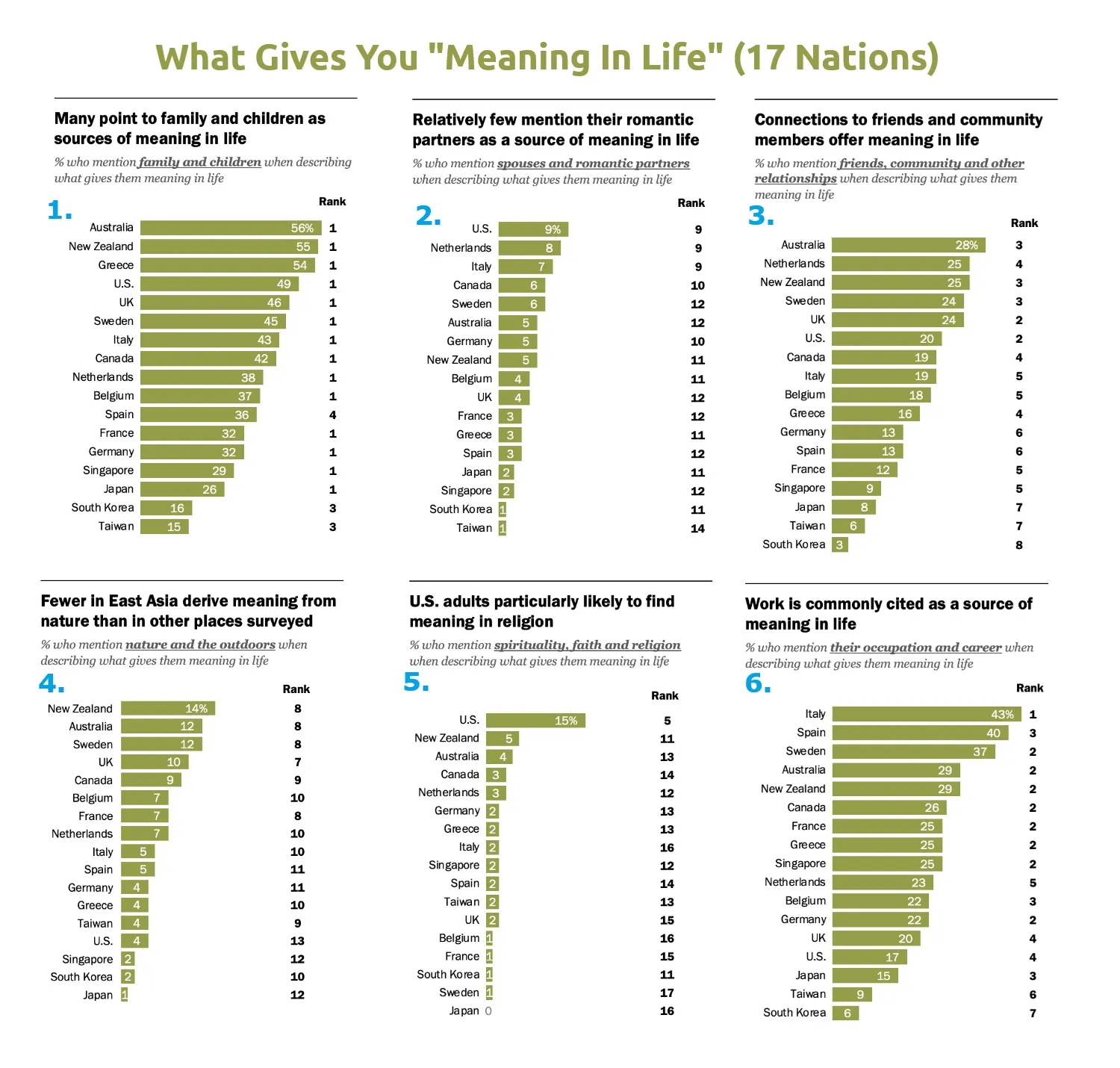
A Quick Test: What Will Matter At The End?
Meaning doesn’t have to wait for a crisis. A simple way to find out what really matters to you is by using the deathbed test:
Imagine yourself in your final days, looking back at your life. Ask yourself:
- What will you be proud of?
- What will you regret not doing?
- What will feel like it was worth all the effort?
Those answers might reveal more about your core purpose than any personality quiz or career test.
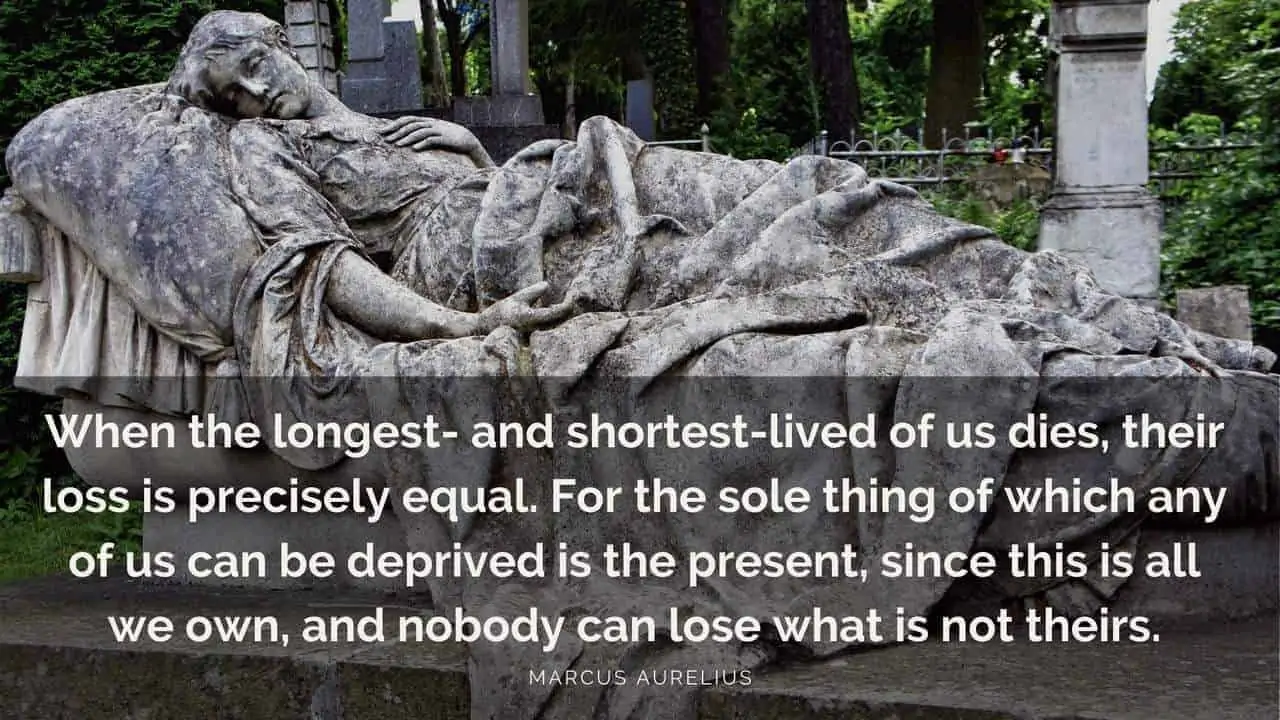
Why Chasing Happiness Isn’t Enough For Meaning
A life filled with pleasure doesn’t always feel meaningful. Such a life often leads to comparison, self-focus, and, eventually, a sense of emptiness.
Research shows that the more we try to pursue happiness, the less happy we often feel.
Despite being the wealthiest, safest, and healthiest generation in history, people today report high levels of loneliness, depression, and dissatisfaction.
We weren’t designed to be “happy” all the time. We were designed to create, connect, and contribute.
Meaning matters more than happiness, and it can’t be substituted by money, freedom, or fun.
Meaning gives a deeper kind of nourishment. It gives your hardship context, adds purpose to effort, and makes joy feel earned rather than accidental.
“You won’t necessarily regret not being happy, but you’ll regret if you didn’t lead a meaningful life.” — Emily Esfahani Smith
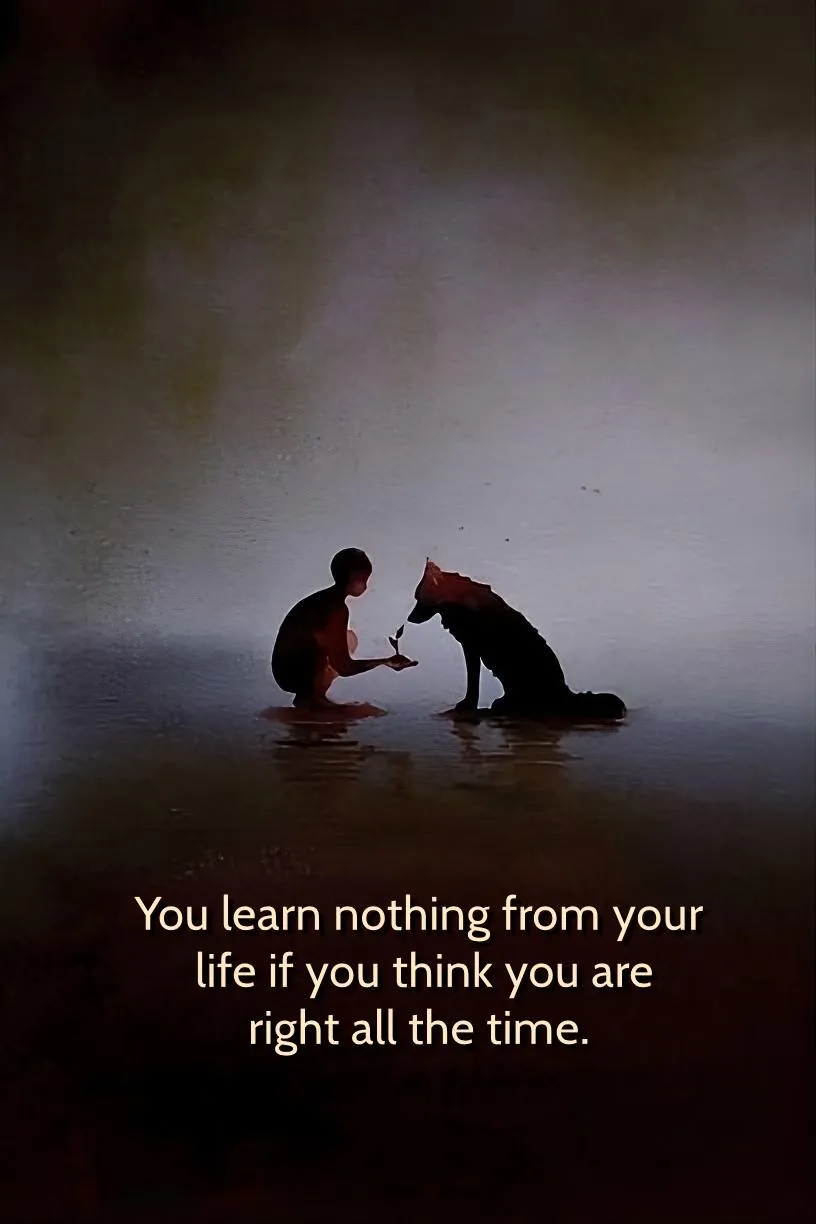
When Meaning Collapses: Insights From Self‑Inflicted Fatalities Data
Losing the sense of purpose in life can be devastating.
One study found that about 13% of those who wrote final farewell notes said life had no purpose left for them. They were not just unhappy; they felt there was no reason to keep on living.
In a survey of 142,000 people from 132 countries, researchers Shigehiro Oishi & Ed Diener found that poorer, more religious countries report lower happiness but higher meaning.
While wealthy, individualistic countries reported higher happiness but lower meaning, and, surprisingly, higher self‑harm rates.

Self‑inflicted fatalities are a public health crisis. Every year, more than 727,000 lives are lost to self-inflicted causes, reports the WHO (2025). More than 50%of these fatalities occur in people below the age of 50.
If you or someone you know is struggling or in crisis, you are not alone. Reach out to a friend, relative, family member, neighbor, or even someone you see passing by. Call the self‑harm prevention helpline in your country or a mental health helpline.
Final Words
Across countries and cultures, three things about meaning stand out:
- Meaning is created through choices, not found by chance.
- Meaningful living needs reflection, courage, and sometimes change.
- Lives built on meaning tend to be healthier, calmer, and more fulfilling.
So nurture what truly matters. Whether your purpose comes from family, creativity, faith, or helping others, keep building it into your daily life.
And stop overthinking. Nothing in life is as important as you think it is.
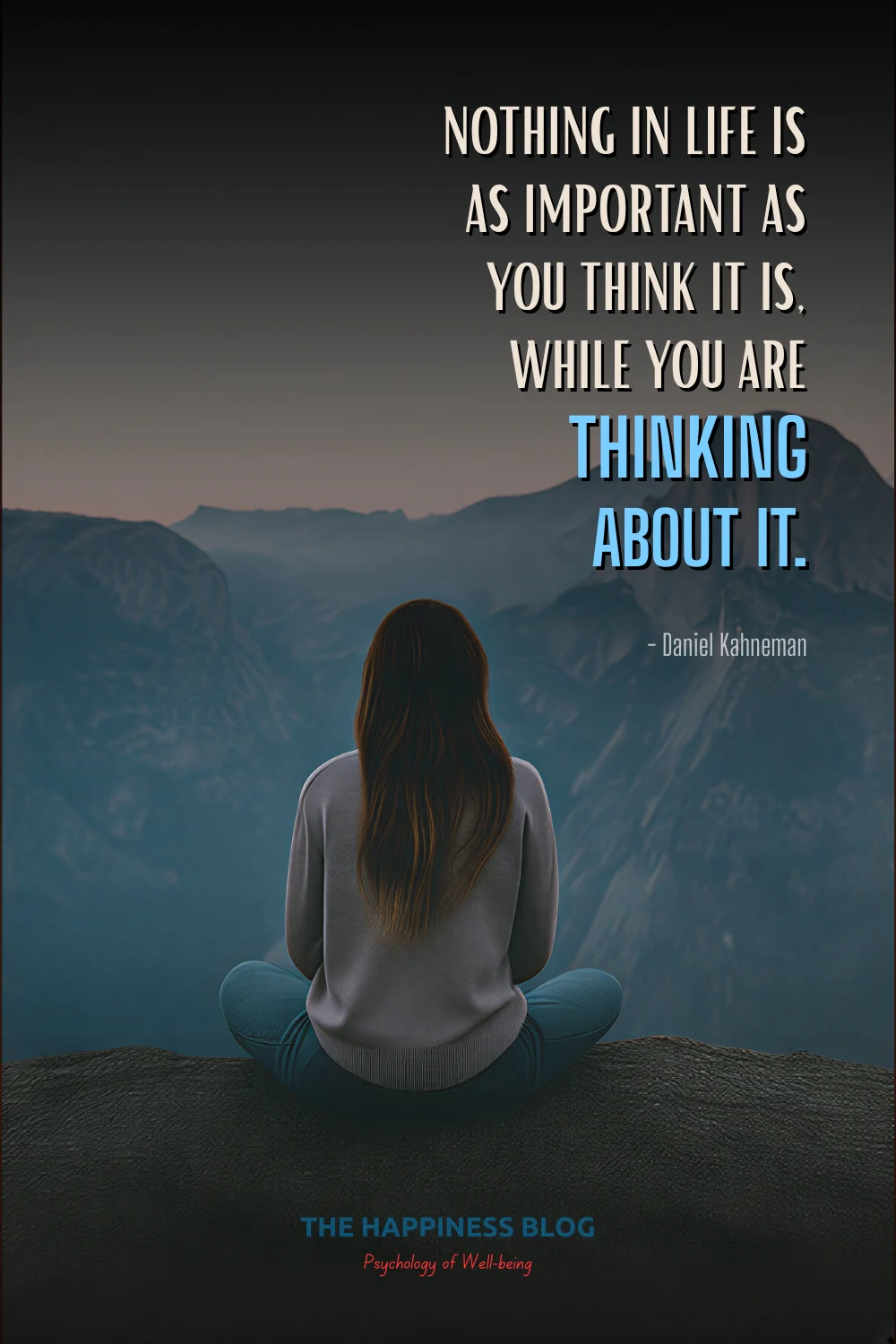
Life becomes richer when it connects to something beyond itself.
Search inside yourself to decide what gives your life true meaning. Then live your one life from that place of meaning.
√ Also Read: 10 Ways To Be Happy In Daily Life: What Do The Experts Say?
√ Please share this if you found it helpful.
» You deserve happiness! Choosing therapy could be your best decision.
...
• Disclosure: Buying via our links earns us a small commission.
